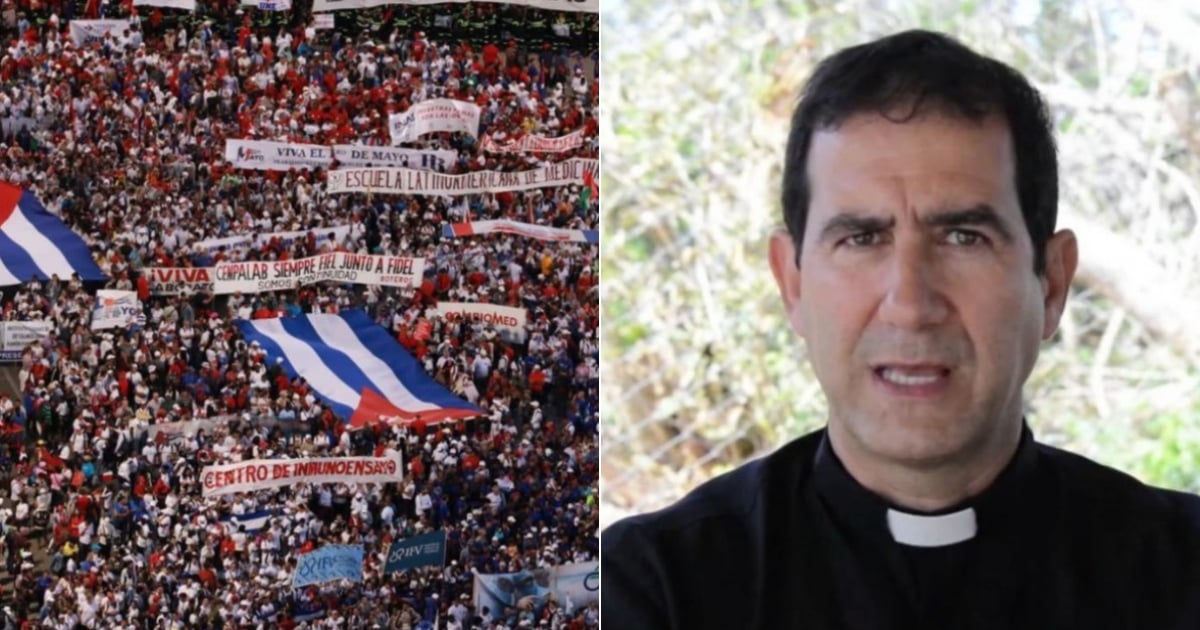Alberto Reyes, a priest from Camagüey, delivered a sharp critique of Cuba's May Day parade, asserting that it represents a collective charade driven by fear, coercion, and enforced compliance. In a reflection shared on Facebook, he revealed that numerous workers were coerced into signing attendance commitments under threat of penalties, while in schools, students were warned that skipping the event could negatively impact their academic evaluations.
According to Reyes, rather than honoring workers, the parade served as a political reaffirmation—a public demonstration of forced obedience. "These are acts of citizen submission, a reminder that our freedom is compromised," he stated. The priest not only criticized the state's apparatus but also addressed the people, urging individual awareness.
He expressed regret that many attended not out of conviction but due to resignation or fear of repercussions. "They've chosen to reenact the theatrical display of apparent support for a system they detest," he declared. He commended those who remained home, recognizing their actions as acts of dignity: "They have dared to confront the fears associated with living freely."
Reyes's words resonate strongly amid a national backdrop of scarcity. Cuba is currently enduring one of its most challenging periods in recent history, marked by prolonged power outages, rampant inflation, chronic shortages, and a nearly collapsed public transportation system. Despite this, the government allocated substantial resources and fuel to ensure the May Day events proceeded nationwide.
This isn't the first time Alberto Reyes has voiced such potent criticism; his public profile has become an unsettling presence within the Catholic Church, known for consistently denouncing the island's oppression and lack of freedoms.
His message not only rekindles the debate over the symbolic value of May Day in Cuba but also highlights one of the most painful contradictions of modern Cuban life: the struggle between the desire for freedom and the routine of fear.
The full text of his Facebook post, shared by CiberCuba, reads: "I've been pondering the reasons behind a parade. May Day has passed, and throughout the country, traditional parades and gatherings took place, events that are officially a deserved tribute to the world of work but, in reality, have a completely different meaning in Cuba: they are acts of political reaffirmation, acts of citizen submission, a reminder that our freedom is compromised.
That's why, in the days leading up to the parade, many workers were forced to sign a 'commitment' to attend, under threat of penalty. That's why schools (at least in Esmeralda) warned that not attending the parade could even result in exam suspensions. That's why thousands of buses were mobilized to gather people from everywhere, with no fuel limitations.
In a social moment where every action counts, many people have done what they could: they stayed home, facing the fears of living freely. Others, I imagine, participated because they might still believe that defending this system is worthwhile, despite the hunger, endless blackouts, and miserable, hopeless life that awaited them upon returning home. However, many others have bowed their heads, choosing to reenact the theatrical display of apparent support for the system they detest.
So, in reality, what did this immense crowd celebrate on May Day? This populace celebrated their fear, their inability to step forward and defend their personal and social autonomy; they celebrated their bondage, their submission, their decision to comply with those who have and continue to make their lives miserable, those whose children receive elite education while ours struggle in an inefficient and precarious system, those who have never been and will never be able to guarantee our health, our economy, or a dignified life. This populace celebrated their decision to play along with the oppressor.
And what did the government celebrate? Certainly not the people's adherence, for they are fully aware they lack it, but they celebrated the people's behavior as if they loved them, as if they supported them, and it's this 'as if' that truly matters to them, for the 'as if' is sufficient to deter anyone from raising their voice in opposition.
But let us not forget that every action counts, big or small, and that every small step of submission to wrongdoing turns not only against the doer but against everyone else, including those they love.
I apologize for this anecdote, but I believe it's worth sharing. Years ago, during the government's offensive against Oswaldo Payá, they requested signatures from the people to ratify the 'revolutionary process.' During those days, a woman attempted to board a passenger truck, but it was full, and the driver told her it wasn't possible. The woman, frustrated, cursed, among other things, the private trucks. The driver, annoyed, engaged in a brief exchange before leaving the woman in a cloud of dust:
- "Ma'am!" he said, "Did you sign?"
- "Of course, I signed!" she proudly replied.
- "Well, deal with it!"
Understanding May Day in Cuba
What is the significance of May Day in Cuba?
In Cuba, May Day is traditionally seen as a celebration of workers. However, according to critics like Alberto Reyes, it serves more as a political reaffirmation and demonstration of citizen submission enforced by the government.
How does the Cuban government ensure participation in May Day parades?
The Cuban government reportedly coerces participation by making workers sign attendance commitments under threat of penalties and warning students about potential academic consequences for non-attendance.
What are the current challenges faced by the Cuban people?
Cuba is currently facing prolonged power outages, rampant inflation, chronic shortages, and a nearly collapsed public transportation system, making daily life increasingly difficult for its citizens.
